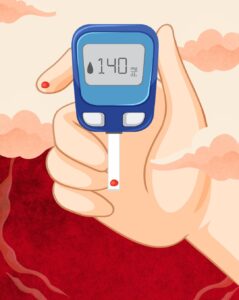Diabetes Prevention & Management: Everything You Need to Know
Learn everything you need to know about diabetes prevention and management. Discover the causes, symptoms, risk factors, foods to avoid, and lifestyle changes to control blood sugar. Stay healthy with expert-backed tips on managing Type 1, Type 2, and gestational diabetes.
Managing diabetes is crucial to maintaining overall health. Whether you’re preventing or managing Type 1, Type 2, or gestational diabetes, making the right lifestyle choices can significantly impact your health and wellbeing. This comprehensive guide provides essential information on diabetes symptoms, risk factors, foods to avoid, and ways to manage blood sugar naturally.
What is Diabetes?
Diabetes is a chronic condition in which the body either doesn’t produce enough insulin or cannot use it effectively. Insulin is essential for regulating blood sugar levels. Without proper management, high blood sugar can lead to serious health issues such as heart disease, kidney failure, and nerve damage.
Types of Diabetes
1. Type 1 Diabetes
- Cause: An autoimmune condition where the immune system attacks insulin-producing cells in the pancreas.
- Onset: Usually diagnosed in children and young adults.
- Management: Requires lifelong insulin injections for blood sugar control.
2. Type 2 Diabetes
- Cause: Insulin resistance, where the body’s cells don’t respond well to insulin.
- Onset: Most common form of diabetes, often linked to obesity, poor diet, and a sedentary lifestyle.
- Management: Can be managed and sometimes reversed through lifestyle changes, including diet, exercise, and weight loss.
3. Gestational Diabetes
- Cause: Develops during pregnancy due to hormonal changes that affect insulin use.
- Onset: Typically diagnosed in the second trimester.
- Risk: Increases the risk of developing Type 2 diabetes later in life.
Causes of Diabetes
Understanding the causes of diabetes can help you prevent and manage it. The main factors include:
- Genetics: Family history increases the likelihood of developing diabetes.
- Unhealthy Diet: Diets high in processed foods, sugars, and trans fats contribute to insulin resistance.
- Obesity: Excess weight, particularly around the abdomen, increases the risk of insulin resistance.
- Physical Inactivity: A sedentary lifestyle hinders the body’s ability to control blood sugar.
- Hormonal Imbalance: Conditions like PCOS and stress can affect insulin production and use.
Early Symptoms & Warning Signs
Recognizing the early symptoms of diabetes is essential for timely intervention. Look out for these warning signs:
- Frequent urination
- Excessive thirst
- Unexplained weight loss
- Extreme fatigue
- Blurred vision
- Slow-healing wounds
- Numbness or tingling in hands and feet
Early detection is key to preventing complications and managing blood sugar levels.
Effects of Diabetes on the Body
If left untreated, diabetes can lead to severe complications:
- Heart Disease: Increases the risk of stroke and heart attacks.
- Kidney Damage: Can result in kidney failure.
- Nerve Damage: Leads to pain, numbness, and mobility issues.
- Eye Problems: Can result in blindness if left untreated.
- Weakened Immune System: Increases susceptibility to infections.
Diabetes Prevention: How to Reduce Your Risk
Taking proactive steps can reduce your risk of developing diabetes. Here’s how:
1. Maintain a Healthy Diet
- Eat fiber-rich foods like vegetables, legumes, and whole grains.
- Choose lean proteins such as chicken, fish, and tofu.
- Reduce processed sugar and refined carbs to manage blood sugar levels.
2. Exercise Regularly
- Aim for at least 30 minutes of exercise daily.
- Include strength training exercises to improve insulin sensitivity.
3. Manage Stress
- High stress can raise blood sugar levels.
- Practice yoga, meditation, and deep breathing to reduce stress.
4. Maintain a Healthy Weight
- Losing just 5-10% of your body weight can significantly reduce your risk of developing diabetes.
5. Get Regular Health Checkups
- Monitor your blood sugar levels regularly.
- An A1C test helps track long-term blood sugar control.
Foods to Avoid for Better Blood Sugar Control
To manage your blood sugar, avoid or limit the following foods:
- Sugary Drinks: Soda, energy drinks, and fruit juices can cause spikes in blood sugar.
- White Bread & Pasta: Refined carbs can spike blood sugar levels quickly.
- Fried Foods: High in unhealthy fats and can increase insulin resistance.
- Candy & Desserts: Cause rapid sugar spikes and contribute to weight gain.
- Alcohol: Can lead to unpredictable blood sugar fluctuations.
Can Diabetes Be Cured?
While Type 1 diabetes currently has no cure, Type 2 diabetes can often be reversed with lifestyle changes, such as:
- Adopting a low-carb, high-fiber diet to improve insulin sensitivity.
- Losing excess weight and maintaining a healthy body weight.
- Engaging in regular physical activity to improve blood sugar control.
- Intermittent fasting may also help some individuals regulate blood sugar.
Best Foods for Diabetes Management
Eating the right foods is essential for managing diabetes. Include the following in your diet:
1. Fiber-Rich Foods
- Leafy greens, broccoli, and carrots provide important vitamins and fiber.
- Chia seeds, flaxseeds, and oats are great sources of fiber and omega-3 fatty acids.
2. Healthy Fats
- Avocados, nuts, and olive oil help improve insulin sensitivity.
3. Lean Proteins
- Include chicken, fish, eggs, and tofu in your meals for protein.
4. Low-Glycemic Fruits
- Berries, apples, and oranges are excellent choices for maintaining stable blood sugar.
5. Whole Grains
- Brown rice, quinoa, and whole wheat provide fiber and help regulate blood sugar levels.
Lifestyle Changes for Long-Term Health
To maintain long-term health and manage diabetes:
- Follow a consistent meal plan to prevent sugar spikes.
- Get enough sleep, as poor sleep affects insulin sensitivity.
- Stay hydrated—water helps regulate blood sugar levels.
- Quit smoking, which can improve circulation and reduce complications.
Final Thoughts on Diabetes Prevention & Management
Diabetes is manageable with the right lifestyle choices. Early detection, proper nutrition, regular exercise, and consistent monitoring can help you prevent, control, and even reverse Type 2 diabetes. Stay proactive in your health journey by making smart dietary choices and consulting a healthcare provider for personalized advice.



